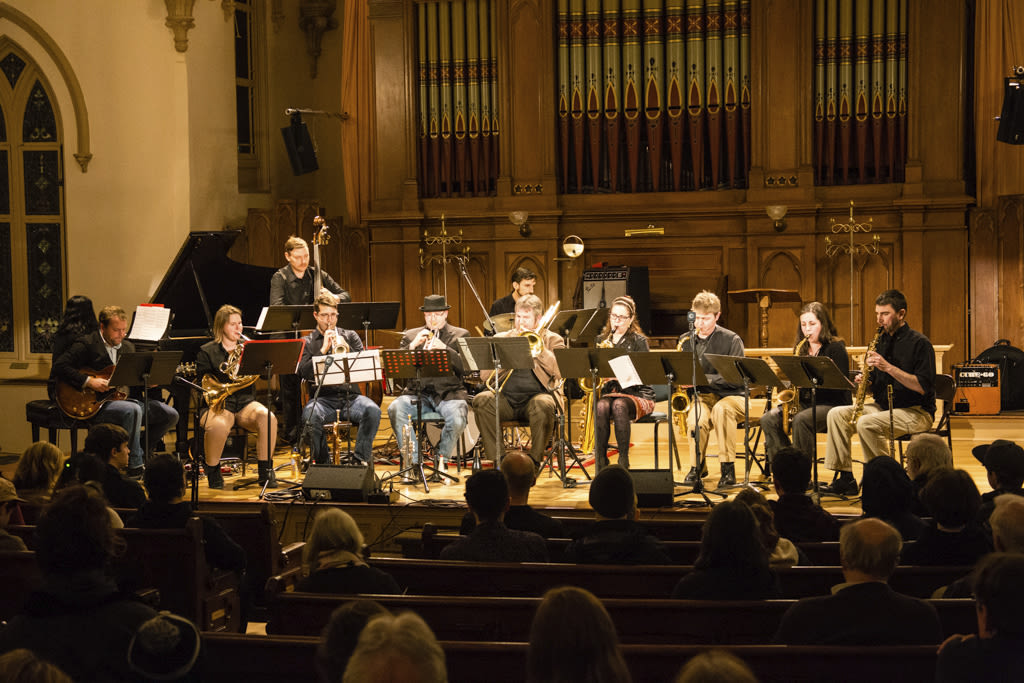What Can Jazz Teach Us About Inequality?

Oregon’s history hasn’t always been roses and craft beer. Once upon a time—around 60 years ago, in the heat of the civil rights movement and at the tail end of World War II—things were very different. In a provocative retrospective by the Portland Jazz Composers Ensemble, that time is revisited through the stories of three heroic Oregonians, against a jazz soundtrack.
The stories—of a Japanese-American man living in Hood River during World War II, an African-American doctor, and the Astorian who became the first woman ever to graduate from a US maritime academy—are produced from interviews with Audio History Project’s Jessica Rand and soundtracked by local jazz aficionados Mark Orton, Darrell Grant, and Douglas Detrick.
With each individual’s story being recounted from their place of birth, we caught up with Detrick in advance of the Portland leg, where DeNorval Unthank’s story will be recounted by his daughter.
Tell us about the genesis of this project—how did it come about?
In addition to being a composer and a musician, I’m really into podcasting. I wanted to reach out to underrepresented communities in Oregon and tell their stories. That’s kind of where this idea came from. I wanted to combine these two interests. How can we tell these stories, and how can that help us reach new people who wouldn’t be listening to these stories, or to jazz music?
What exactly is an “audio documentary”? How is jazz a part of it?
Jessica Rand, who plays the music and announces the show produces a short form series called A Jazz Life, which is people telling their own stories about how they got into jazz and what it means to them. The content of Oregon Stories is a bit longer—just short of 20 minutes long for an hourlong program (split up between three stories). The audio story portion of it will be like a live radio experience, but the stories are already recorded from interviews that are edited. We will be playing jazz at the same time. Additionally, the Oregon Stories project is more about these people’s experiences as members of underrepresented minority communities in Oregon and how that’s affected their lives.
How did you choose the three individuals you decided to focus on?
The first one that I picked was DeNorval Unthank—he was one of the first black physicians that lived and worked in Portland. He was very active in the civil rights movement as he was a co-founder of the Urban League and City Club, and had them take on a lot of civil rights issues. When he moved into Portland during the mid-'20s and bought a home, most of Portland was very heavily segregated, so he moved into a white neighborhood. Due to various forms of harassment from his neighbors, he had to move his family five or six times over as many years. When I learned about DeNorval’s story and all the amazing things he did while he was dealing with all this harassment from his neighbors, I thought to myself: I wish more people knew. Then we had to find somebody to tell his story and we found his daughter Leslie.
With the other two, I read a news clip about Deborah Dempsey, who was the Columbia River bar pilot and coast guard. She was disembarking from a cargo ship in the ocean and guided it out of the Colombia River; however, she fell into the water and had a near-death experience. The third story is of George Akiyama, who was a Japanese-American Hood River resident who fought in Europe during World War II.
Why these three people?
These three stories center around people I felt were deserving of wider recognition. Unthank, for example, is somebody who a lot of people just don’t know about. These stories allow us to talk about discrimination and about how the city is changing and how welcoming Portland is to minority communities.
Jazz has always been music that has celebrated the underdog. Now, you can get a degree in jazz in college—but it’s still music that’s not the most popular music out there, but it has a strong connection to human rights. There is a strong connection to celebrating the triumph of the individual in less than ideal circumstances.
What do you hope to achieve in these performances and shows? How do you want them to become part of a general conversation about inequality? How do you think it will change people’s perceptions of jazz?
I do want this show to be a part of a larger conversation. A lot of times people will think of artists as people with things to say about social issues, and some people just want artists to entertain and not have an opinion. We can show that artists can have an impact on these conversations. Jazz at its worst is insular because it takes a lifetime of study and dedication to be great at this form. There’s a lot of passion and energy in this community that goes towards perfecting the craft. We wanted to show that this community in Portland has something to say about inequality
Most of these stories are in the past—they’re all history. We’re not making a strong statement about how things should be going forward, but we’re saying these are stories that we should be more aware of because they might help us make more enlightened decisions about the future.
Oregon Stories comes to the Old Church on Friday, April 8. Visitors will hear the story of DeNorval Unthank, as told by his daughter.
